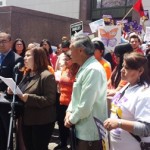California has billions of surplus dollars this year. In his revision of the budget, Governor Jerry Brown is proposing to put a large part of this money toward paying off part of the debt and saving for an emergency fund. In addition, Brown hopes to invest like never before in K-12 education and to create a new earned income tax credit for the lowest-income tax payers. Even so, groups representing the poor say Governor Brown should use this opportunity to reinstate millions cut during the recession from important health insurance and human service programs that covered undocumented immigrants and the poorest of the poor. The final budget will be decided after negotiations this summer between the legislature and the governor. Our correspondent in Los Angeles, Rubén Tapia, spoke with some of those affected by cuts.
One of the groups that was disappointed with Brown’s revised budget were homecare workers for people with disabilities. Bertha Ramo has a 23-year-old son who suffers from severe disability.
“He has cerebral palsy, profund delay, hypotonic muscles. He can’t walk or grab onto anything. He’s like a nine-month-old baby. We have to bathe him. We have to do everything he needs,” says Ramo.
Ramo believes her son was born with a disability because of medical negligence. She worked in a tortilla factory and had to quit in order to take care of him. She battled for 3 years to get financial help. For 20 years, she has received aid, but two years ago, because of the fiscal crisis, the state cut her income by 7 percent.
“Now I get $ 654 dollars,” she says.
That monthly amount isn’t enough for her to pay the $800 rent on her modest apartment in Los Angeles. Ramo gets by with the help of family members, but now she doesn’t have any extra income.
“My husband is incapacitated right now, because he hurt his back and is waiting for surgery. I am in a really bad place economically,” says Ramo.
There are an estimated 135,000 homecare workers in California in similar situations since the recession began. It makes Ramo wonder if she should have voted for Governor Brown, as she did in the last election. She hoped he would restore the funding.
“It is sad because a person like Governor Brown, when he asked for our vote, we gave it to him,” says Ramo.
Many other sectors of the most marginalized were also left out of the revised budget: students who were brought up in forster care no longer have help for their rent and food while they go to school. The unemployed who received money from CalWorks and those who received California food stamps didn’t receive increases that would have changed their lives substantially.
What Governor Brown did do was to propose a tax credit for the lowest-income workers. He also proposed a fund to help immigrants apply for DACA and DAPA, says Angelica Salas, executive director of the Coalition for Humane Immigrant Rights of Los Angeles, or CHIRLA.
“He put 5 million dollars in his budget so that organizations will have the staff to help our people. It’s not enough, but it’s a very positive start,” says Salas.
But the numbers of possible beneficiaries in California are large, and more resources ar needed, according to Carlos Amador of the California Immigrant Policy Center.
“Here in California there are approximately 1.2 million undocumented people who could benefit from Obama’s new executive action and we are trying to get help from the government for 20 million dollars for education and services,” says Amador.
Budget negotiations are set to end in June. Meanwhile, advocates for immigrants and the poorest of the poor in the state will continue to negotiate with both the governor and the legislature. One of these negotiations is centered around asking the governor to support a proposal to offer health insurance for undocumented immigrants. Senate president Kevin de León emphasized that at an event for Immigrant Day on the steps of the State Capitol in Sacramento.
“Access to healthcare costs us a lot, particularly in the emergency rooms up and down the state of California. That’s why we want to invest money through the SB4 program. Obviously, we have to do a better job of lobbying and negotiating with the governor,” said De Leon.















